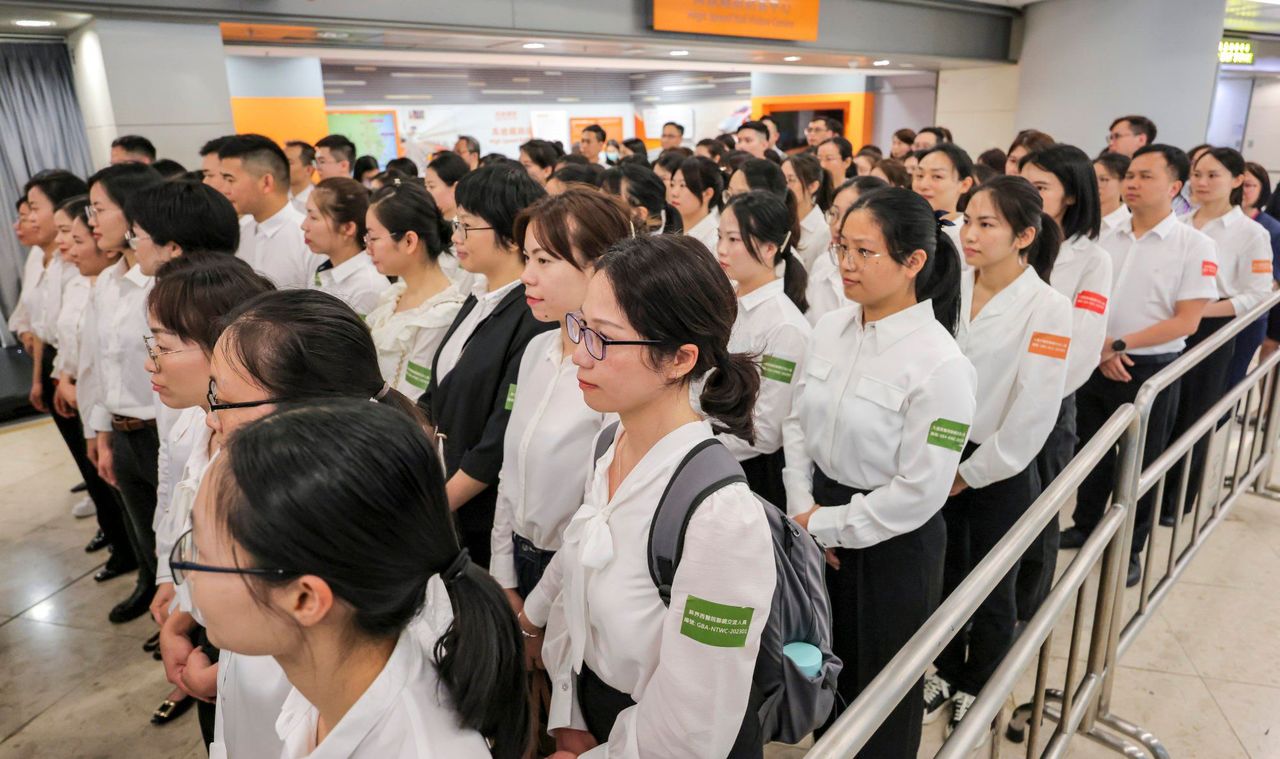Hong Kong News

AI specialists, builders among Hong Kong’s expanded talent list for quick visas
Artificial intelligence specialists, medical professionals such as midwives, and builders are among the new job types in Hong Kong’s expanded talent list which allows workers to obtain a visa within four weeks under a fast track arrangement.
The talent list, first created in 2018 to lure overseas professionals to the city, would be expanded from 13 occupations to 51 to attract more high-quality workers and cope with a shortage in the city, the government announced on Tuesday.
The new job types include nurses, doctors, dentists, Chinese medicine practitioners, architects, land surveyors and builders to ease the worker shortage in the medical and construction sectors, according to the Labour and Welfare Bureau.
 Participants of a Greater Bay Area talent scheme at West Kowloon Station.
Participants of a Greater Bay Area talent scheme at West Kowloon Station.
Secretary for Labour and Welfare Chris Sun Yuk-han said he was confident the government would be able to meet its target of attracting enough talent from around the world.
“Expanding the list is part and parcel of our efforts to attract talent to Hong Kong. The purpose of the list is mainly to facilitate foreign talent to come to Hong Kong under three [talent] schemes,” he said.
“The overall KPI [Key Performance Indicator] we set for ourselves on the talent side is to attract 35,000 [workers] every year, from this year onwards and for the next two years, and they are expected to stay in Hong Kong for 12 months at least.
“We are confident that we are going to meet the target for this year, considering the very positive response to the various schemes we have put in place to attract talent from out of Hong Kong.”
The updated list comprises 51 job types under nine industries. Development and construction and healthcare services are newly-added sectors. The rest are business support, creative industries, arts and culture, performing arts, environmental technology services, financial services, innovation and technology, legal and dispute resolution services and maritime services.
The talent list will apply immediately to the General Employment Policy (GEP) scheme, Admission Scheme for Mainland Talents and Professionals (ASMTP) and Quality Migrant Admission Scheme (QMAS), with applicants being able to obtain a work visa within four weeks compared with a process of several months under the normal channel.
Under the first two schemes, employers who wish to fill vacancies for the listed job types can be exempted from taking a market availability test, while qualified applicants can receive an additional 30 points under QMAS’ scoring system.
But Sun stressed that applicants, such as those in the medical and legal industries, must satisfy certain requirements stipulated by their industries before being allowed to join the workforce. This includes meeting their respective registry requisites or passing relevant exams.
“The talent list focuses on attracting top talent so we require that the applicants should at least be university graduates,” he said.
“This list aims to provide convenience for successful applicants to obtain a work visa but they need to meet the city’s professional requirements to practise their trade in Hong Kong.”
Medical and health services sector lawmaker Dr David Lam Tzit-yuen said adding jobs such as doctors and nurses to the list would not result in immediate improvements to the labour shortage.
“I have never heard of anyone [in the medical industry] not being able to come to Hong Kong due to visa issues,” he said. “The nature of the job and lifestyle are factors that are probably more important for workers who are considering moving to the city.”
He noted there were existing mechanisms to recruit overseas doctors in the city, such as the special registration and the limited registration schemes, adding that applicants under these programmes were still subject to screening carried out by the Medical Council.
Raymond Tsang Chi-chung, vice-president of the Hong Kong Physiotherapy Association, said the expanded list would not have a huge impact on their recruitment situation.
He said many physiotherapists from overseas chose not to work in the city because of the language barrier.
Tsang added that physiotherapists from mainland China were not allowed to work in Hong Kong as there was no qualification mechanism for the industry across the border.
Wong Ping, chairman of the Hong Kong Construction Industry Employees General Union, expressed concerns over the expanded list.
“We’ll support the government if the move can help the city’s development but we fear that some employers will abuse it by importing cheap labour from overseas,” he said.
“We are also concerned the move will affect the employment of local talent and youth. We hope the government will provide policy support to help young people move up the career ladder.”











